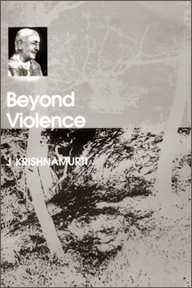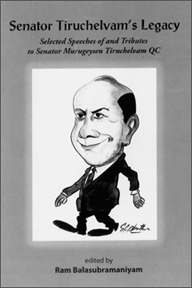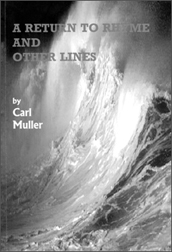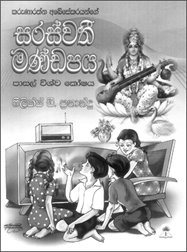|

Plea for psychological revolution
Reviewed by R. S. Karunaratne
We see violence all around us in different degrees. There is extreme
violence in certain countries facing internal crises and war with other
countries. Violence is so much a part of our lives that we see it in
teledramas, films and newspapers.
All the religions are all out to eradicate violence and usher in an
era of peace. However, the world is fast becoming a hotbed of violence.
Jiddu Krishnamurti, one of the most prominent philosophers of the
East, always used to ask the pertinent question: Is it possible to end
this tremendous violence in oneself? According to him, human beings are
violent by nature. For instance, they have remained violent throughout
their existence on this planet.
 We
have enough evidence to prove that man's violence has created havoc in
the world. Man's unhappiness and misery are mainly due to violence. What
can a peace-loving man do to get rid of violence? We
have enough evidence to prove that man's violence has created havoc in
the world. Man's unhappiness and misery are mainly due to violence. What
can a peace-loving man do to get rid of violence?
Man has advanced technologically in many fields. He has found cures
for various deadly diseases. His knowledge in many areas has paved the
way for speedier travel and communication. However, there is hardly any
discipline in society. We do not respect authority. At times we feel
that we are living in a chaotic era.
Krishnamurti suggests that we should try to communicate with each
other in order to examine our views. For this we have to shed our petty
prejudices and sentimentalities. We have to do this because all the
"isms" have failed to bring us real happiness and peace of mind.
Krishnamurti always advocated inner change or inward revolution. If
an individual can change his thinking pattern, he does not have to join
a revolution.
Inward revolution requires you to examine yourself. This does not
mean escaping from reality or clinging onto various theories for
salvation. When you change inwardly, the whole society will change
automatically.
Krishnamurti's views on religion may sound somewhat controversial. He
says, "Religion has become a matter of dogma, belief in ritual,
something which is totally divorced from daily living. You may or you
may not believe in God, but that belief has very little meaning in daily
life, where you cheat, where you destroy... (You) are ambitious, greedy,
jealous, and violent."
As the book is a collection of Krishnamurti's lectures, it includes
many questions raised by those in the audience. Once he was asked
whether it was necessary to have a (spiritual) teacher. He said, "... if
the teacher says he knows, and wants to instruct the disciple, then be
suspicious, for the man who says he knows does not know. (This is)
because truth, the beauty of enlightenment cannot ever be described."
In many of his discourses, Krishnamurti paid attention to fear. He
says that fear is one of the most common things in life. We have
accepted it as a way of life. Although there are many types of fear -
psychological and psychosomatic - we must try to understand the nature
of fear. Then how do we overcome fear? He says, "Just be with it, (then)
you will see a very strange thing happen."
Most of us have heard of people who claim to have psychic powers.
Once, a person in the audience asked Krishnamurti how to develop psychic
powers. In his usual unruffled way Krishnamurti told him, "To have
extra-sensory perceptive experience you must be extraordinarily mature,
extraordinarily sensitive, and therefore, extraordinarily intelligent;
and if you are extraordinarily intelligent, you do not want psychic
experience." Even the Buddha said that the exhibition of psychic powers,
such as travelling in the air, was something cheap and not worthy of an
enlightened person.
People very often ask "What is the purpose of life or human
existence?" Krishnamurti's point of view is quite different from what a
religious dignitary would say. He says, "Our daily life has no meaning,
no purpose, except to make a bit of money and lead an idiotic kind of
life.
You can invent a thousand purposes but you need not go anywhere, not
to the Himalayas, to a monastery, or to any ashram - which is another
form of concentration camp - because everything is in you."
Another matter that worries human beings is death. If you really
understand Krishnamurti's teachings, you will never fear death. He says,
"What matters is how you live now, not what you will be in the next
life."
The last chapter on "Psychological revolution" will be of special
interest to psychology students and practitioners.
In a world full of divisions and dissentions the question is whether
we can bring about changes politically. Krishnamurti believes that we
need a psychological revolution, not something like the French
Revolution, to change the whole social structure.
Krishnamurti believes that we have become machines or second-hand
people. We have become psychologically and intellectually mechanical. It
is tragic that we do not realise the danger of leading a mechanical
life.
Krishnamurti's views on meditation needs close attention. He says,
"Meditation means awareness: to be aware of what you are doing, what you
are thinking, what you are feeling, (be) aware without any choice, to
observe, to learn." Such meditation makes the mind clear and sensitive.
As has be seen, "Beyond Violence" is not all about violence. It
encompasses many other subjects which are relevant to men who are
interested in the pursuit of knowledge.
Search for a united Sri Lanka
Reviewed by S. Muthiah
I wonder how many remember Murugeysen Tiruchelvam, Q.C. whose legacy
was a dream he had for his country. Over and over in the 1960s and
1970s, he reminded people of the roots of the ethnic fracturing
happening in what was then Ceylon and how it could be healed. It is a
narration as little remembered by those worldwide free with advice to
the political groups in the island nation as by the very political
leaders of what has since become Sri Lanka.
 Many
post-1983 experts on Sri Lanka will remember his son, Neelan Tiruchelvam,
who followed in his father's footsteps but fell tragic victim to the
Tigers of Tamil Ealam for advocating negotiations to bridge the ethnic
chasm. What Neelan urged he had developed on the foundations laid by his
father who had in his youth been memtored by S.J.V. Chelvanayaka, K.C.,
who was to later lead the Federal Party. Both guru and chela were
eminent lawyers, Chyelvanayakam guiding his ward through the labyrinths
of law that exist in the island. In time, Tiruchelvam became not only a
Queen's Counsel but also Ceylon's Solicitor-General. Many
post-1983 experts on Sri Lanka will remember his son, Neelan Tiruchelvam,
who followed in his father's footsteps but fell tragic victim to the
Tigers of Tamil Ealam for advocating negotiations to bridge the ethnic
chasm. What Neelan urged he had developed on the foundations laid by his
father who had in his youth been memtored by S.J.V. Chelvanayaka, K.C.,
who was to later lead the Federal Party. Both guru and chela were
eminent lawyers, Chyelvanayakam guiding his ward through the labyrinths
of law that exist in the island. In time, Tiruchelvam became not only a
Queen's Counsel but also Ceylon's Solicitor-General.
When the ethnic issue began to boil post-1956, he who had always
stood for a united and plural Ceylon watched with growing dismay till,
finally, he felt he had to play a role in resolving it. Resigning from
Government Service in 1968, he joined the Federal Party and became
Chelvanayakam's chief advisor.
When the United National Party (UNP) led by Dudley Senanayake came
into power and formed a National Government in 1965, Tiruchelvam was
appointed to the Senate (the Upper House) and also made Minister of
Local Government. When the Federal Party quit the coalition in 1969,
Senator Tiruchelvam resigned his ministerial post but continued to
support the Government from outside till its term ended in 1970. When
the Sri Lanka Freedom Party (SLFP)-led United Front Government came into
power in July that year, Tiruchelvam sat in the Opposition till the
abolition of the Senate in October 1971. During those six years in the
Senate, he was the chief spokesman for the Tamials in the House.
A small-made, soft-spoken man, Tiruchelvam was neither a great orator
nor a flamboyant lawyer. What he scored with was an incisive mind that
helped to make telling arguments with the wealth of facts he specialised
in marshalling. His livewire wife Punitham was associated with numerous
social causes, teaming with women from all ethnic backgrounds.
As a couple they were the typical Colombo Tamils of the era who as
bureaucrats, doctors, lawyers, engineers, accountants and even as an
Army, Navy and Police chiefs played a significant role in Ceylon till
the 1960, though by then the writing had begun to show on the wall.
That writing was what Tiruchelvam desperately tried to erase in all
the speeches he made in the Senate between 1965 and 1971, particularly
on such issues as devolution and local language rights. Much of what he
advocated resulted in the Tamil Language (Special Provisions)
Regulations of 1966, the establishment of Jaffna University, and his
opposing the Fedeeral party's 1976 resolution demanding a separate Tamil
Ealam, strongly advising a division of the country.
What his speeches reveal is how little the Federal Party sought in
the early years, how the too little always came too late, and how till
the end he kept pleading for a united country. Some of what he said -
sometimes quoting others - I offer here as a reminder of the solution he
saw for what he repeatedly called "our country," pleading with the
Sinhalese not to blame the Tamils for the Chola and Pandya invasions
that left him and his fellow Tamils sons of Ceylon soil for 2500 years
and having the same love for it as them.
As early as 1944, the State Council debated making Sinhala and Tamil
the official languages of the country. During the debate S.W.R.D.
Bandaranaike, to become Prime Minister in 1956, stated, "I do not see
that there would be any harm at all in recognising the Tamil language as
an official language." Sen. Tiruchelvam recalling this in his maiden
speech in the Senate in April 1965, went on to point out that Mr.
Bandaraike, after the Official Language Act (erroneously called the
Sinhala Only Act) was passed in 1956, agreed to Tamil being the language
of administration in the Northern and Eastern Provinces and to creating
regional councils. Tiruchelvam stated that undoing the Official Language
Act was not the intention of the Federal Party; it only wished that
everyone in the Northern and Eastern Provinces who wanted it should be
able to do their administrative work in Tamil. Mrs. Bandaranaike, too,
after succeeding her husband in 1959 following his assassination, was
prepared to respond favourably to this by enacting the Tamil Language
(Special provisions) Act. In January 1964, Tiruchelvam reminded the
House that all the parties appeared to be favourably disposed to the Act
and "the reasonable use of Tamil." He then stressed "My Party does not
want to divide the country. In no part of the world is it accepted that
federalism divides country... We are of this country and we do not have
any other country to go to..."When a National Government succeeded the
United Front, the Tamil Language (Sepcial Provisions) Bill, considered
one of Tiruchelvam's "seminal achievements," was passed in January 1966.
In the course of piloting the Bill, an outcome of the
Senanayake-Chelvanayakam Pact replacing the abortive Bandaranaike-Chelvanayakam
Pact of a decade earlier, Tiruchelvam described as "a historic occasion"
the passing of the Bill that "sought to restore to the Tamil speaking
people of this country the right, in some measure, to administer their
own affairs in the Tamil language." He went on to add that it was the
wish of the Tamil speaking people of the country "to live in this
country on terms of friendship, amity, equality and dignity consistent
with their Sinhalese brethren" and the Bill would go a long way towards
this.
New books on the
shelf
'A return to rhyme and other lines'
 Cart
Muller's latest book of poetry entitled 'A return to rhyme and other
lines' was published recently as a Godage publication. He is a
well-known novelist, short story writer and poet. Cart
Muller's latest book of poetry entitled 'A return to rhyme and other
lines' was published recently as a Godage publication. He is a
well-known novelist, short story writer and poet.
The poetry collection is divided into three sections. Poems written
to resurrect rhyming poetry are found in section one.
The second section is devoted to blank verse that represents snatches
of thought and random ruminations. In section three he has included
rhymed poetry once again.
Carl Muller's poems are a treat to poetry lovers. RS
Book launch
 "Saraswathi
Mandapaya" "Saraswathi
Mandapaya"
Felix D. Fernando's "Saraswathi Mandapaya" will be launched by
Malpiyali Publishers, Dankotuwa tomorrow.
The book includes rare information about Karunaratne Abeysekera and
his ethics practised in radio announcing.
'Akala Meghaya'
Thilaka Kudahetti's latest Sinhala novel 'Akala Meghaya' will be
launched at Dayawansa Jayakody Book Exhibition Hall, Ven. S. Mahinda
Mawatha, Colombo 10 on April 27 at 10 am.
Kudahetti is the author of several other novels and translations such
as 'Nethata Kandulak Se, Vathsunu Pavatha, Durga Tharanaya, Neela Desa
Pura, Kulagei Vilanguva, Vathura, Bharatha Yogin Saha Isivarain Samaga,
Piramida Bhuthain Egipthu Sannasin Ha Manthrakaruvan Samaga, Avul Haraya'
and 'Anthassarayo.'
'Akala Meghaya' is a Dayawansa Jayakody publication. |

